Contagious as fear
FREETOWN, December 12, 2014 – Travelling to Sierra Leone to report on the Ebola crisis, I was expecting a country paralysed by the epidemic, full of people in rubber boots, gloves and masks – avoiding each other like the plague. And it was nothing like I had imagined.
London, in early November. AFP is looking for a video reporter to travel to Sierra Leone for a fortnight. After ravaging the country’s east, where it borders Liberia and Guinea, the Ebola epidemic was spreading worryingly fast to the west, including the capital Freetown. At that point, more than 10,000 people have been infected with the haemorrhagic fever in west Africa (the figure has since doubled), with a death rate of 60 to 70 percent. I volunteer without a doubt. This is a story I want to tell.
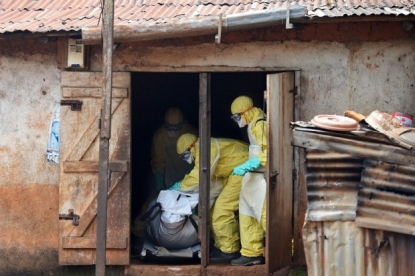
Health workers from the Red Cross Society prepare to carry a body out of a house in Freetown on November 12, 2014
(AFP Photo / Francisco Leong)
When I tell friends and family of my plans, and watch them turn pale, I soon realise that Ebola’s power to terrify extends far beyond Africa. They tell me I am crazy to even consider it. What if you get infected? And what about the risks for us when you return home?
I decide to go anyway. It feels to me like a journalistic imperative.
Of course before leaving I read up extensively on the virus, how it is transmitted and how to stay safe. AFP’s protocol is clear: never go anywhere near a sick person or a body; always stay six metres away from a suspected case; wash your hands constantly with anti-bacterial solution. If I follow the rules to the letter, I will be fine. Remains to be seen how I can do my job as journalist -- which is all about meeting and talking to people.
I leave on November 5 with photographer Francisco Leong and journalist Anne Chaon – the latest in half a dozen AFP teams to travel to Ebola-hit west Africa.
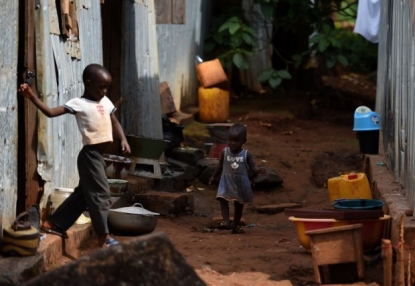 Children play outside their house in Lester Road, Freetown, on November 7, 2014 (AFP Photo / Francisco Leong)
Children play outside their house in Lester Road, Freetown, on November 7, 2014 (AFP Photo / Francisco Leong)Landing in Freetown, barely out of the plane and before we even enter the terminal, we are asked to wash our hands with chlorine solution. A few metres ahead, staff in white scrubs and surgical masks hand us a leaflet on Ebola and check our temperature with an infrared thermometer. The first of many, many such checks.
A scenic taxi-boat ride across the Sierra Leone river, which separates the airport from the city, and we reach our hotel. Once again, we get our temperature checked – before getting the keys to our room. And so it will be throughout our stay – in official buildings, at army road checks, pretty much everywhere we go.
I would be lying if I said I felt no apprehension at all. This was my first AFP mission to Africa, but I had visited the continent before, and I knew how often you find yourself surrounded by happy hordes of little children, wanting to chat, play and cuddle. How could I be certain none of them was sick?
Those fears soon turn out to be baseless. No children come near me at all. Those who try are quickly called in line by the adults around them. Sierra Leoneans have long taken on board the basic precautions against Ebola contagion.
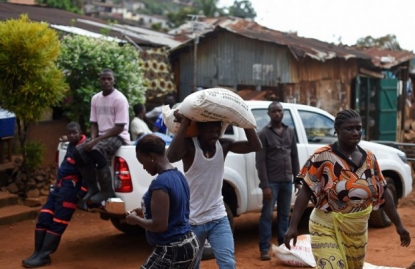
A Freetown family carry supplies delivered by the World Food Programme as they observe a quarantine at home
(AFP Photo / Francisco Leong)
Our first reporting trip is with a team from the World Food Programme, distributing food in areas under Ebola quarantine. We follow their convoy into a poor neighbourhood, its little houses clinging to the hillside. The road winds past deserted construction sites. Michael, our driver, explains the government has suspended all building works due to the epidemic.
But all around us, the taxi bikes still whiz their passengers around, the poda-poda – Freetown’s distinctive minibuses – come and go, packed as usual. Street vendors keep selling their wares, from stalls set up under parasols or laid out on the floor. The street is alive, the pavements heaving with people.
In the city, it is almost as if Ebola does not exist.
Yes, there are the banners warning people not to eat bush meat, that of bats and monkeys in particular, and reminding them of the disease’s symptoms.
Yes, the city’s bars and nightclubs are closed, and public gatherings forbidden. You won’t find the usual throngs of people around a television set when there’s a football match on.But the markets are open, people are out and about, going to work, to church and to the mosque. Religious services are the only public gatherings still allowed, although worshippers try to avoid physical contact and the warm embraces typical of Baptist religious rites.
::video YouTube id='kGazXWzzojc' width='620'::Life goes on. Hairdressers plait women’s hair on the sidewalk while chatting with their neighbours. Couples come to take in the cool evening air on Aberdeen beach. Prostitutes ply their trade on the roadside after dark, half-hidden in the bushes.
When I call home to Europe, there’s a gulf between what I see and what they imagine. My family are worried. They think I spend my days stepping over bodies in the street, dressed in an astronaut’s suit, to the constant wail of ambulance sirens.
The West’s fear of Ebola just doesn’t square with the reality I witness in Africa. For months European and North American television has been full of images of doctors in full protective garb, field hospitals where people are dying in their dozens.
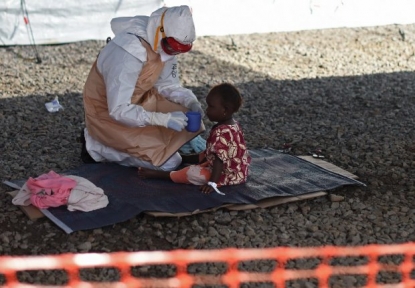 A health worker and a young Ebola patient at the Kenema treatment centre in eastern Sierra Leone (AFP Photo / Francisco Leong)
A health worker and a young Ebola patient at the Kenema treatment centre in eastern Sierra Leone (AFP Photo / Francisco Leong)That’s understandable of course. The images are powerful, the stuff of disaster movies, “Contagion”-style.
And those things do exist. We visit the treatment centres. We follow the gravedigger teams. We seek out the pictures of doctors and nurses in their white space suits.
But the spectacular, frightening images makes it all the more important to tell the human side of the story too – as AFP and other media have sought to do for months now. Ebola’s impact on daily life, the economy schools, maternal health, sexuality.
Talking to people in Freetown, and in the provinces, Port Loko in the north, Kenema in the east, everyone is clear on the basics: protect ourselves, follow the safety rules, avoid bodily contact – the official ABC slogan that all echo and apply.
It is also clear that things are not always so simple. Should a mother not touch her child whose fever could be a symptom of Ebola, but could also be malaria? Should she let him die to avoid contaminating the rest of the family? Ignore him to save his own life?
::video YouTube id='W6Ru7LuU_gc' width='620'::We meet a young woman named Hawa, 33 years old. She comes from Mabella, a slum in Freetown. She survived Ebola but lost her husband and two of her children to the virus. She says the safety rules are not always easy to follow. « When you come here, you have no choice but to touch others. There are too many people everywhere. If you go to the market it’s impossible not to touch people.”
Now immune, Hawa decided to become a “contact tracer” for the Red Cross. She keeps in contact with the families of the sick and dead, who are monitored daily, or even quarantined, for 21 days. She teaches them about basic safety rules, and why they matter.
Then there is Sillah, a 14-year-old from Moyamba Junction in the country’s southeast. He caught Ebola but survived. His father died along with three of his brothers and sisters. His thoughts are turned now to his future. When his school reopens, who will pay his fees?
::video YouTube id='mfyVfq9Nnmk' width='620'::Everywhere we find a fighting spirit, looking for ways to move forward once the epidemic is over.
Idriss is another Ebola survivor, who lives in the Freetown suburb of Waterloo. He lost eight family members to the tropical fever. Today he is worried for his remaining relatives. They are struggling to put food on the table, and he is having trouble finding work because of the epidemic. Some among his neighbours shun him for fear of contagion. To persuade them he is not a threat, he carries with him at all times a health certificate stating he has survived Ebola and poses no health risk to anyone.
All these ordinary people, with extraordinary stories. People living in the barest of conditions. Who have only just emerged from 12 years of civil war and unspeakable atrocities and who now find themselves struck by one of the most violent, and frightening pathogens known to man.
And yet the fear of Ebola somehow seems less present there than it is here in Europe.
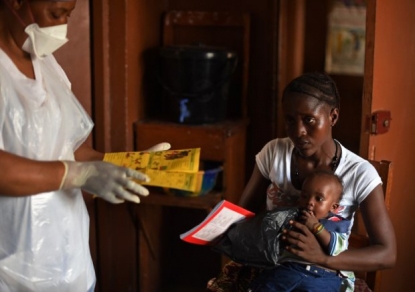
A mother is briefed by a nurse during a routine visit at the Mabella Community Health Centre in Freetown
(AFP Photo / Francisco Leong)
The message from the experts is clear: the risk of contracting Ebola outside of Africa is virtually nil. And if it does occur, the chance of survival is infinitely higher in our state-of-the-art US or European hospitals than in the west African outback.
That won’t stop people panicking in Europe. The fear of this devastating fever, whose victims often die amid atrocious suffering, leaping from Africa to our doorstep, taps into a primal fear of a killer pandemic. But the huge media attention given to each white victim is out of proportion to that given to the suffering of whole populations, facing the full force of the crisis in Guinea, Sierra Leone or Liberia.
What this assignment taught me is that fear can be more contagious than a virus.
Celine Clery is an AFP video reporter based in London, She travelled to Sierra Leone for two weeks in November as part of a three-person multimedia team.


